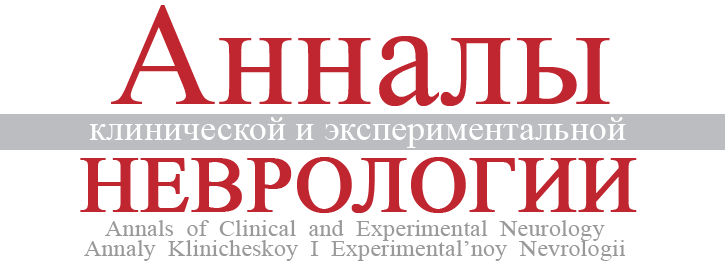Сопряженность показателей энергетического обмена и уровня гормона стресса кортизола с когнитивными характеристиками больных дисциркуляторной энцефалопатией
- Авторы: Фокин В.Ф.1, Шабалина А.А.1, Пономарева Н.В.1, Медведев Р.Б.1, Лагода О.В.1, Танашян М.М.1
-
Учреждения:
- ФГБНУ «Научный центр неврологии»
- Выпуск: Том 12, № 4 (2018)
- Страницы: 47-51
- Раздел: Оригинальные статьи
- Дата подачи: 13.12.2018
- Дата публикации: 13.12.2018
- URL: https://annaly-nevrologii.com/journal/pathID/article/view/548
- DOI: https://doi.org/10.25692/ACEN.2018.4.6
- ID: 548
Цитировать
Полный текст
Аннотация
Введение. У больных дисциркуляторной энцефалопатией (ДЭ) выполнение когнитивных задач может сопровождаться развитием стресса и увеличением уровня кортизола, влияющего на регуляцию метаболизма инсулина и глюкозы. Повышенный уровень кортизола может вызывать нейродегенеративные изменения в гиппокампе, инсулинорезистентность и гипергликемию, что оказывает неблагоприятное влияние на когнитивные функции.
Цель: оценить связь показателей уровня кортизола, инсулина и глюкозы и их реактивности с успешностью выполнения когнитивных функций у пациентов с ДЭ.
Материалы и методы. Обследовано 84 больных с ДЭ I–II стадии (60 женщин и 24 мужчин) в возрасте 43–87 лет. Пациенты с диабетом 2-го типа и метаболическим синдромом исключались из выборки. Для когнитивного тестирования применяли последовательность из трех тестов (корректурного, вербальной беглости и оценки вербальной памяти – тест Лурия). У больных определяли уровень кортизола и инсулина в слюне, а также глюкозы в периферической капиллярной крови до и после тестирования когнитивных функций.
Результаты. При когнитивной нагрузке у женщин уровень саливарного кортизола и инсулина достоверно увеличивался, а уровень глюкозы крови – снижался. У мужчин аналогичные по направленности реактивные изменения уровня этих гормонов и глюкозы не достигали статистической значимости. У мужчин и женщин более высокая реактивность кортизола сопровождалась более низкими, а инсулина и глюкозы – более высокими показателями выполнения когнитивных тестов.
Заключение. У больных ДЭ выполнение когнитивных тестов сопровождается реактивными изменениями уровня кортизола, инсулина и глюкозы, сопряженными с успешностью выполнения когнитивных тестов.
Об авторах
Виталий Федорович Фокин
ФГБНУ «Научный центр неврологии»
Автор, ответственный за переписку.
Email: fvf@mail.ru
Россия, Москва
Алла Анатольевна Шабалина
ФГБНУ «Научный центр неврологии»
Email: fvf@mail.ru
Россия, Москва
Наталия Васильевна Пономарева
ФГБНУ «Научный центр неврологии»
Email: fvf@mail.ru
Россия, Москва
Роман Борисович Медведев
ФГБНУ «Научный центр неврологии»
Email: fvf@mail.ru
Россия, Москва
Ольга Викторовна Лагода
ФГБНУ «Научный центр неврологии»
Email: fvf@mail.ru
Россия, Москва
Маринэ Мовсесовна Танашян
ФГБНУ «Научный центр неврологии»
Email: fvf@mail.ru
Россия, Москва
Список литературы
- Sergeant J. The cognitive-energetic model: an empirical approach to attention-deficit hyperactivity disorder. Neurosci Biobehav Rev 2000; 24: 7–12. PMID: 10654654.
- Фокин В.Ф., Медведев Р.Б., Пономарева Н.В. и др. Латерализация билатерального кровотока по центральным и периферическим артериям при когнитивной нагрузке у больных дисциркуляторной энцефалопатией. Асимметрия 2018; 2: 74–84.
- Розанов В.А. Стресс и психическое здоровье (нейробиологические аспекты). Социальная и клиническая психиатрия 2013; 1: 79–86.
- Фокин В.Ф., Пономарева Н.В., Лагода О.В. и др. Влияние гормонов на реактивность межполушарной асимметрии при когнитивной нагрузке у больных дисциркуляторной энцефалопатией. В сб.: Пирадов М.А., Иллариошкин С.Н., Фокин В.Ф. (ред.) Материалы Второй всероссийской конференции с международным участием «Фундаментальные проблемы нейронаук: функциональная асимметрия, нейропластичность, нейродегенерация». М., 2016: 275–280.
- Kahn C.R., Suzuki R. Insulin action in the brain and the pathogenesis of Alzheimers disease. In: Craft S. (ed.) Diabetes, Insulin and Alzheimer’s disease. Berlin, 2010; XIV: 218.
- Geer E.B., Shen W. Gender differences in insulin resistance, body composition, and energy balance. Gend Med 2009; 6(Suppl. 1): 60–75. doi: 10.1016/j.genm.2009.02.002. PMID: 19318219.
- Танашян М.М. (ред.) Сосудистые заболевания головного мозга и метаболический синдром: руководство для врачей. М., 2017. 334 c.
- Фокин В.Ф., Пономарева Н.В. Технология исследования церебральной асимметрии. В кн.: Пирадов М.А., Иллариошкин С.Н., Танашян М.М. (ред.) Неврология ХХI века. Диагностические, лечебные и исследовательские технологии. М., 2015; 3: 350–375.
- Rafalski V.A., Brunet A. Energy metabolism in adult neural stem cell fate. Prog Neurobiol 2011; 93: 182–203. doi: 10.1016/j.pneurobio.2010.10.007. PMID: 21056618.
- Hirvonen J., Virtanen K.A., Nummenmaa L. et al. Effects of insulin on brain glucose metabolism in impaired glucose tolerance. Diabetes 2011; 60: 443–447. doi: 10.2337/db10-0940. PMID: 21270256.
- Салмина А.Б., Яузина Н.А., Кувачева Н.В. и др. Инсулин и инсулинорезистентность: новые молекулы-маркеры и молекулы-мишени для диагностики и терапии заболеваний центральной нервной системы. Бюллетень сибирской медицины 2013; 5: 104–118.
- Park C.R. Cognitive effects of insulin in the central nervous system. Neurosci Biobehav Rev 2001; 25: 311–323. PMID: 11445137.
Дополнительные файлы








